#lebanese american poetry
Note
Hi I’m sorry to barge in about this but these last few posts about feeling invalid in ethnicity hit home for me. My grandfather was Lebanese and died before I could meet him, and aside from my mother I have no other Lebanese culture in my life. I have always felt pride in my heritage (especially after learning about grandpas possible skirmishes against the IDF? Unclear) but I’ve always felt like an outsider because I don’t know many other Arabs/SWANA irl and wasn’t raised in a typical Lebanese home. Obviously there are major differences between these two situations, but I wanted to know if you had any more suggestions on how to find community? At least for someone to tell me if I’m appropriating a culture I am only a fourth of. Again Sorry, I know this isn’t what you do here and I understand if it’s wasting your time. Thanks for being on this stupid app regardless
hey your grandpa sounds badass! im sorry you've always felt like an outsider... i will say, i'm not sure if it's cultural appropriation if you have familial ties to lebanon and acknowledge your history there. if anything, i think you still have a right to interact with it as a way to investigate your grandfather's history.
something that really connects me to palestine is literature. books, poetry, essays, think pieces — these expose me to a wide range of opinions and understandings of the world around them. do you happen to know if your grandfather had any writings from back then? or if you can ask your mother for stories about him? i've been trying to get my own grandpa on the phone to hear about his experiences in palestine before the Nakba.
it also might help to look into different writers and artists online and interact with them. I share a lot of tweets from palestinians (doctors, artists, writers) because that's where i learn the most about palestinian culture in palestine and the diaspora. I know I recommended them earlier, but I'd look up Radius of Arab American Writers. Their vibe is something I think you'd appreciate.
if you're part of any distinct groups like medical care or environmentalists, i would google "Lebanese Doctor Association" or "Lebanese Archivists." That's how I found librarians and archivists for Palestine.
but literature is still my go-to either way. I don't know many lebanese writers, but I do know fairuz LOL and she's probably the most famous lebanese person. Khalil Jibran is also a famous lebanese writer you might look into.
if anyone else has any tips, feel free to add on. im sorry, i don't know if i helped too much. i hope that you can reconnect with your grandfather's heritage and learn more about him. good luck and, more than anything, have fun.
28 notes
·
View notes
Text
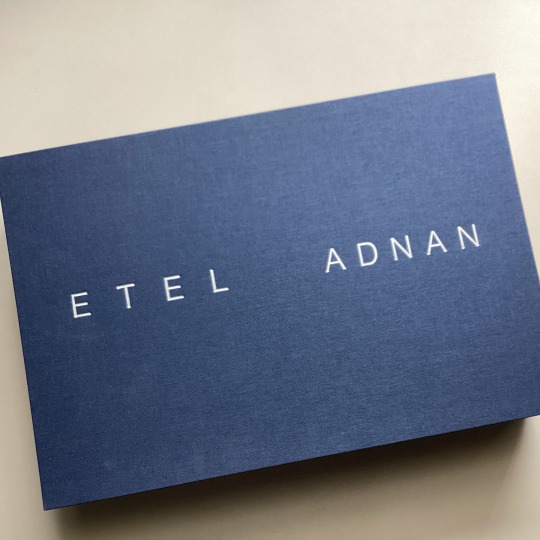
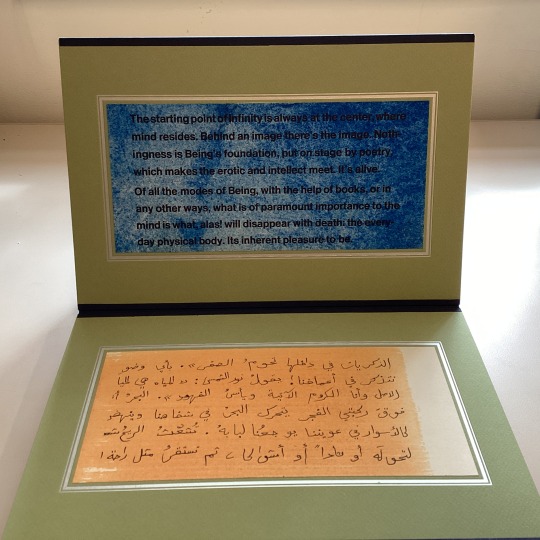
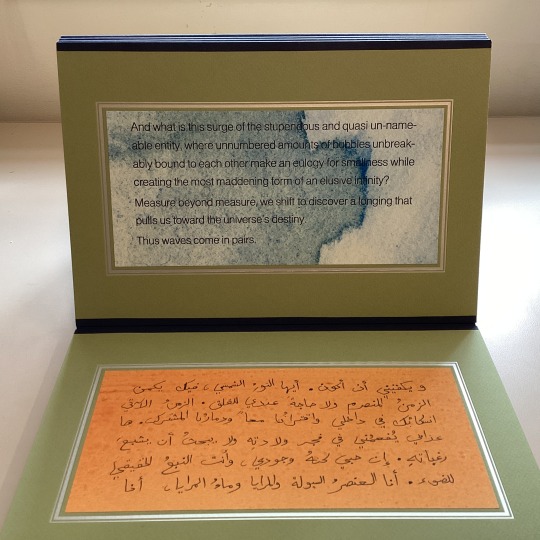
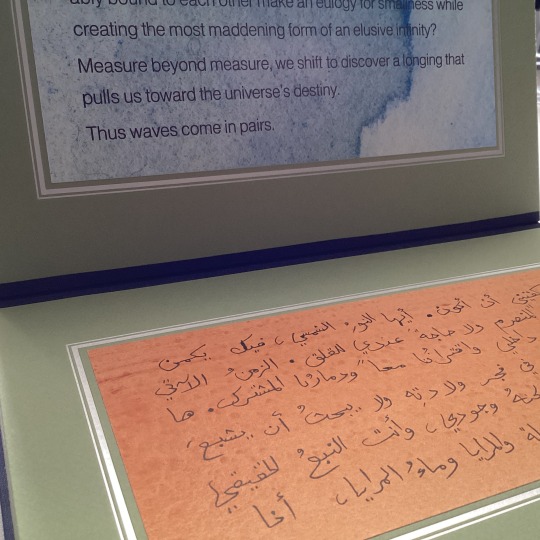
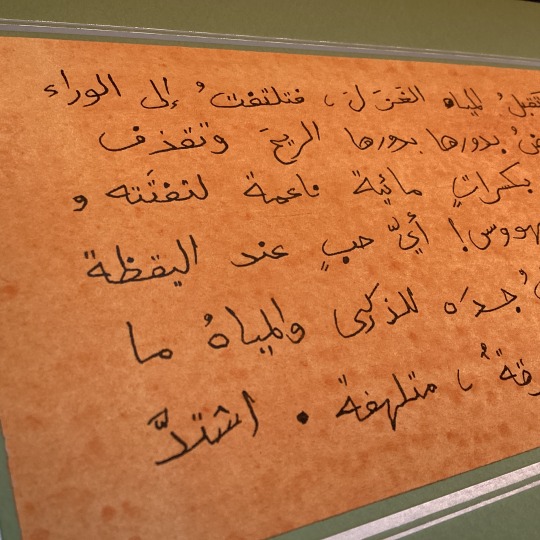
April is Arab American Month and National Poetry Month.
“I write what I see and I paint what I am.” – Etel Adnan
Etel Adnan (1925 – 2021) was a Lebanese-American poet, philosopher, writer, and visual artist. Adnan had been painting for several decades and made visual works in a variety of media including artist’s books, films, and tapestries.
Adnan was born in Beirut, Lebanon to a Greek Catholic mother and a Muslim-Turkish father, who was a high-ranking Ottoman officer born in Damascus, Ottoman Syria. She grew up speaking Greek and Turkish in a mostly Arabic-speaking society. After enrolling at a French Lebanese Catholic School at the age of five, her primary language became French and her early works were written in French. She also studied English in her youth, and most of her later work was written in English. Adnan studied philosophy at the Sorbonne, the University of California at Berkeley, and Harvard University, later teaching philosophy at San Rafael’s Dominican College from 1958 to 1972.
Adnan’s love of language and interest in Arabic calligraphy is evident in her visual art, especially in leporellos, little books with folded concertina-style pages. But color was also language to Adnan, and one can sense that in her paintings.
Later in her life, Adnan openly identified as lesbian. She was survived by her partner, Simone Fattal, who is also a visual artist.
The Fine Arts Library owns Adnan’s artist’s book entitled “The Book of the Sea.” The work is made up like a sample book of Arabic calligraphy handwritten by Adnan, presenting the poems in Arabic and in English, with the original text and translations facing each other.
The book of the sea
Etel Adnan ; bound by Thomas Zwang.
Livre de la mer. English & Arabic
Poestenkill, N.Y. : Kaldewey Press, 2010.
1 volume (unpaged) ; 21 x 31 cm.
Edition Kaldewey ; v. 53
English and Arabic
HOLLIS number: 99156665172003941
#EtelAdnan#ArabAmericanArtist#ArabAmericanMonth#LebaneseAmericanPoet#LebaneseAmericanArtist#HarvardFineArtsLibrary#Fineartslibrary#Harvard#HarvardLibrary#SpecialCollections#NationalPoetryMonth
10 notes
·
View notes
Link
0 notes
Quote
Did an unknown number text you "Hello" lately? "Invasions" is my year long attempt to spam scammers with poetry ... and what unfolded.
As Robotexts and Robocalls encroached on the privacy of my small digital enclave, I felt sad and helpless. A space I thought was mine was deemed a virtual garbage by modern predators. I decided to do something about this invasion of sorts, and started invading back. Something about this felt therapeutic and I built a habit out of replying to unwelcome texts.
What started as poetic text replies to scammers slowly extended to other forms of literature. Slowly, every text genre became a candidate for poetic invasion: I remixed conspiracy-filled social posts, reimagined meditation exercises, made collages out of porn phishing emails, perverted astrological chart readings, jumbled American jokes and so much more. "Invasions" became an eponymous book, collection of art prints and a poetry show.
My poetry became a shape-shifting chameleonic conqueror feeding on words that weren't mine. My poems became swarm-like, parasitic, emerging from a collective literary rumbling I was increasingly failing to grasp, until I decided to occupy it.
I picked the word “Invasions” in January 2022. In February that year, the word gained new charge as Russia invaded Ukraine. As a Lebanese citizen who lived through the Syrian and Israeli invasions of Lebanon, I’m keenly aware of the Ukrainian people’s struggle and the weight of the word I’ve chosen. This collection of parasitic poems, like so much of my work, is an irreverent perversion of what we’ve come to accept as our set reality and an uncompromising rebellion against that which attempts to subdue us into it.
Invasions: Poetry to Strike Back at Robotexts... by Madi, Halim
0 notes
Text
Sept 23, 1923: The Prophet by Kahlil Gibran was published, exactly 100 years ago, a book of 26 prose poetry fables written in English by the Lebanese-American poet and writer.
The Prophet has been translated into over 100 different languages, making it one of the most translated books in history, as well as one of the best selling books of all time. It has never been out of print.
Born a Maronite, Gibran was influenced not only by his own religion but also by the Bahá’í Faith, Islam, and the mysticism of the Sufis.
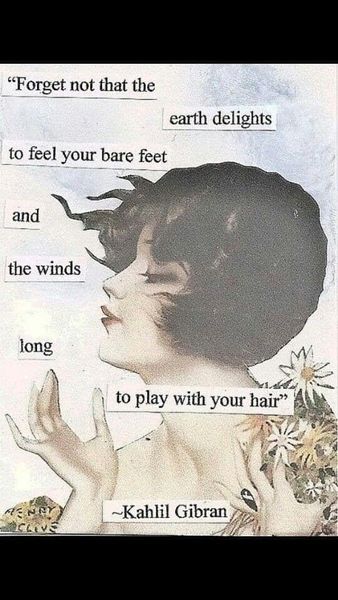
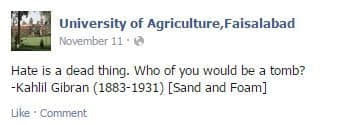
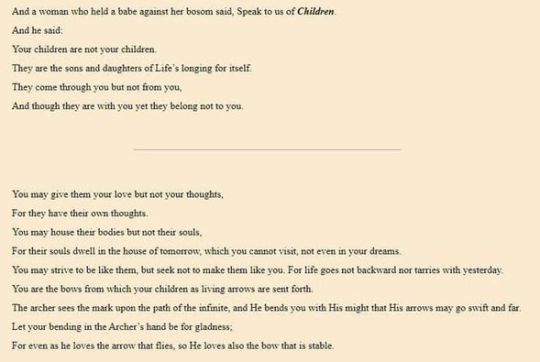
source: https://en.wikipedia.org/wiki/Maronites
0 notes
Text
‘I Discovered That the Act of Writing Is Also an Act of Drawing’
Journey to Mount Tamalpais, Etel Adnan. Private collection Courtesy Galerie Claude Lemand, Paris; © Etel Adnan.
Lebanese-American painter-poet-novelist Etel Adnan (1925-2021) was interviewed by Gabriel Coxhead for the June 2018 issue of Apollo. I’m drawn to her work for how it mingles Arabic language, painting and poetry.
Journey to Mount Tamalpais (detail; 2008), Etel Adnan. Private collection…
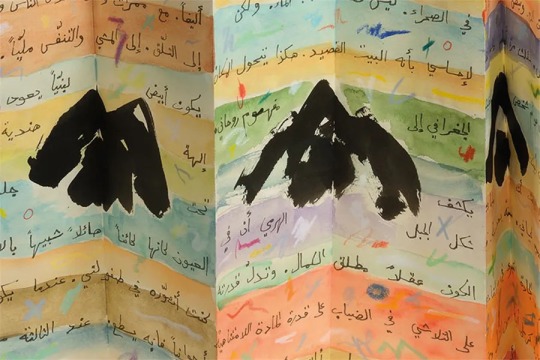
View On WordPress
0 notes
Text
Jacir Screens at the 53rd Nashville Film Festival
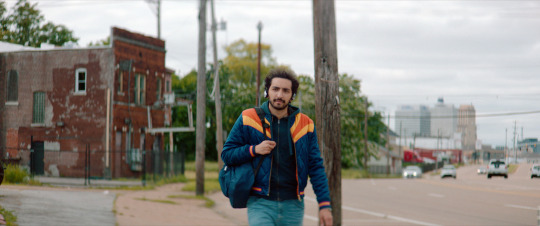
“Jacir” screened on Friday, September 30th, at the 53rd Annual Nashville Film Festival. It is the story of a refugee, Jacir, as he flees Aleppo (Syria) and tries to assimilate into the ghetto (Memphis, Tennessee). Written and directed by Waheed Qawasmi, the 1 hour and 44-minute film is filled with great performances, good rap music, and a variety of profound insights into what life as an immigrant in the United States is like.”
Synopsis: “JACIR follows the life of a young Syrian refugee (Malek Rahbani) on the streets of Memphis, Tennessee, as he faces the stark reality of chasing the American dream. He finds himself alone, living in poverty, without knowledge of the culture, and struggling with his poor English… very far from the ideal new life he imagined.” (”Land of the free. Bullshit!”)
https://www.youtube.com/watch?v=rKKQQLIvtC0
Jacir is a Good Samaritan who tries to help others. This propensity for being there for others gets him into trouble with the immigration authorities and his sponsor, Adam (Tony Mehanna). The authorities, represented by Agent Simmons (Mark Jeffrey Miller), just want refugees to become ghosts. Don’t make waves is the operating mantra.
Jacir, however, is the kind of person who tries to help others out of empathy and instinct. He saves his neighbor’s life on one occasion and intervenes when she is being robbed by burglars. This causes his name to appear on police reports, which brings ICE authorities down on him causing increased scrutiny of his paperwork and an actual chase through the streets of Memphis.” He faces deportation until a climactic moment when others reach out to help him.
A strange new environment is the least of Jacir's problems. He befriends a cat, Morty, who belongs to his next-door neighbor, Meryl Jackson (Lorraine Bracco) “Good old Meryl” is a conservative Caucasian lady who is an opioid-addicted shut-in and former blues singer. Her character represents a large swath of America who reflexively rejects people from another country as interlopers, reacting with suspicion and hostility, no matter how friendly the stranger appears. Unwelcoming is an understatement.
Tremendous Thespian Trio
The three leads portraying Meryl, Jacir, and Jerome are terrific. They are ably supported by the actors playing the restaurant boss, Adam, and his daughter, Nadia.
Lorraine Bracco, who plays Jacir’s next-door neighbor, is an Oscar, Emmy, and Golden Globe nominee known for her turns in Martin Scorsese's Goodfellas and David Chase's The Sopranos, among many other films and TV projects. Bracco gets the line, “I’m not good at a lot of things, but I am good at listening.” I’m certain I’m not the only “Sopranos” fan in the audience who immediately thought of Bracco’s stint on that show as Tony Soprano’s psycho-therapist, Dr. Jennifer Melfi, a role she played from 1999 to 2007. That whiskey quality in her voice made her character’s back story as a blues singer very believable and gave her singing of the song “Night by Night” authenticity. Meryl, as a widowed woman estranged from her only son, finally “does the right thing” and accepts Jacir’s overtures of friendship and goodwill, instead of expressing her initial racist diatribes. Her performance is in line with her outstanding role in “Goodfellas” in 1990 for which she received an Oscar nomination as Best Supporting Actress at the 1991 Academy Awards.
Newcomer Malek Rahbani is the grandson of Mansour Rahbani, the Lebanese composer, musician, producer, and one-half of the Rahbani brothers. Malek grew up surrounded by artists, music, and poetry. His TV career includes playing Tiger on Chawareh Al-Zill and co-writing and acting in the Jungle Law series, which he worked on with his brothers, Mansour and Tarek. He is one of a formidable trio of lead actors in this thoughtful film, gradually growing close to “good old Meryl” and experiencing rejection from his employer and sponsor, Adam, who tells him, “I curse the day I sponsored you.”
The third member of the Terrific Trio of actors in this exploration of the refugee experience in the United States is a Black comedian and actor Darius “Tutweezy” Tutwiler, a social influencer with over 700,000 followers on Instagram. Jerome, a co-worker of Jacir’s at the Arabic restaurant shares the realization that they are both outcasts in this country, shunned and discriminated against. At one point, Jerome tells Jacir that he is “one step closer to being a Memphis n----.” Jacir’s showing up in a Trump/Pence shirt that says, “Making America Great Again” is a nice sarcastic touch (Jerome makes him go change).
Justin Toland composed the music; Al Kapone executive produced the rap song. The music is an integral part of the film. Like America itself, reactions to Jacir are a polyglot mélange of racist views that one might hear from the MAGA crowd (especially prominent in a restaurant scene). Against that fabric, we see the hopeful attempts to fit in and be useful from the good-hearted Jacir, the general indifference of white residents like Meryl or the immigration officials, and the brave souls who recognize that Jacir is deserving of their compassion and empathy.
The script is insightful and thought-provoking. The character of Jerome makes it very clear that being Black in America is not much better than being an immigrant refugee; the destruction of the restaurant where Jerome and Jacir work, with graffiti saying “Sand N------” underscores the truth of what Jerome says. (“We go through the same shit, fool!”) Cinematography by Ryan Earl Parker depicts Memphis’ Beale Street almost as though it were a fever dream like those that afflict Jacir almost nightly as he remembers the war-torn Syria from which he fled.
I nodded my head in agreement when the screenplay articulated the thought, “It’s just so much easier to tear things down than to build them up.” These are concepts that people like Steve Bannon should take to heart. Convicted con-man Bannon promotes “the second turning” of complete destruction of all established norms and authorities in interviews. (See “American Dharma”).
As the script points out, it seems as though “Everyone (in America) is just out for themselves.” But Jacir is living up to his mother’s words that he should stay strong and composed no matter what happens. He is one of the “good guys” whose assimilation can make our country stronger and cancel out the evil deeds of immigrants like those who perpetrated the Boston Marathon Bombing. It is easier to understand why a foreigner might strike out against their adopted country when we experience life as seen through Jacir’s eyes. And, on the eve of Hurricane Ian, we must remember that good does still exist in this country, with strangers reaching out to help their fellow man, side-by-side with those who would collaborate to use pandemic funds set aside for hungry school children in Minnesota to buy luxuries. Even World Famous quarterbacks are implicated in such selfish behavior, but good people still exist, just as welcoming citizens balance out the racist isolationists.
At one point, Jacir cries out in agony, asking where he is supposed to be at home since he has been driven from his own homeland and is now being rejected by his adopted country. However, as Jacir says, “When you have a couple of bullets fly past your head---at that point neither religion, money or citizenship will help you out.”
This is a great film with a Terrific Trio of three lead actors who make it work. The love interest is Leila Almas Rose as the feisty Nadia and the critical look at the U.S. and how we treat immigrants is both scathing and long-overdue. Both “Tutweezy” and Malek Rahbanni do themselves and the film proud on what I hope will be the beginning of many future films for each. Jacir screened at the Nashville Film Festival in 2022.
Read the full article
0 notes
Text

Ameen Rihani, from Grape Leaves: A Century of Arab-American Poetry; “From: A Chant of Mystics”
#excerpts#writings#literature#poetry#ameen rihani#fragments#selections#words#quotes#poetry collection#poetry in translation#lit#typography#arab american literature#arab american poetry#lebanese american poetry#lebanese american literature#moon#soul#anthologies
2K notes
·
View notes
Quote
When I stood a clear mirror before you, you
gazed into me, and saw your image.
Then you said, “I love you.”
But in truth you loved yourself in me.
Excerpt from Sand and Foam, by Kahlil Gibran. As featured in the 1926 edition of the same name.
#poem#poetry#poet#short poem#short poetry#lebanese american poet#lebanese american poetry#lebanese american poem#1920s#1926#vintage#vintage book#vintage books#vintage poem#vintage poetry#Antique#antique books#antique book#antique poetry#antique poems#love#mirror
36 notes
·
View notes
Text
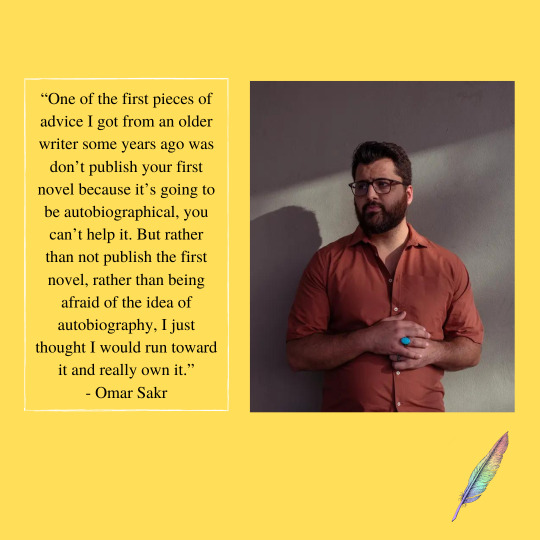
“One of the first pieces of advice I got from an older writer some years ago was don’t publish your first novel because it’s going to be autobiographical, you can’t help it. But rather than not publish the first novel, rather than being afraid of the idea of autobiography, I just thought I would run toward it and really own it.” - Omar Sakr
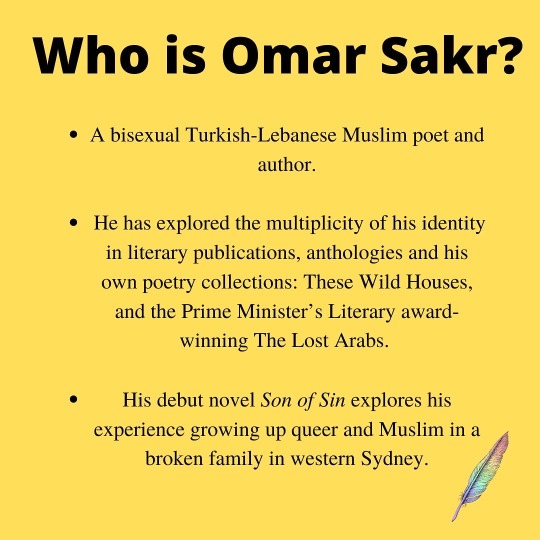
Who is Omar Sakr?
• A bisexual Turkish-Lebanese Muslim poet and author.
• He has explored the multiplicity of his identity in literary publications, anthologies and his own poetry collections: These Wild Houses, and the Prime Minister’s Literary award-winning The Lost Arabs.
• His debut novel Son of Sin explores his experience growing up queer and Muslim in a broken family in western Sydney.
#arab american heritage month#arab lgbtq#arab#bisexuality#bisexuality visibility#muslim#islam#poet#poetry#omarsakr#oma sakr#the lost arabs#son of sins#turkey#lebanon#lebanese#turkish#Turkish-Lebanese
26 notes
·
View notes
Photo
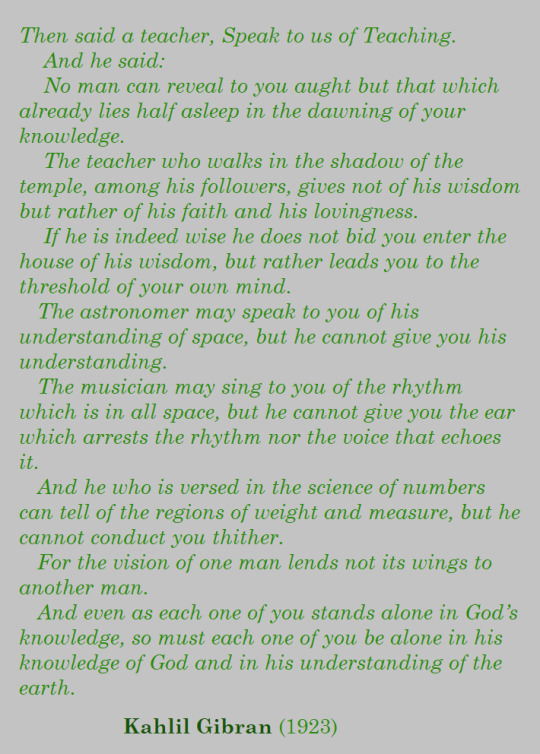
“On Teaching” from Lebanese-American poet Kahlil Gibran’s 1923 masterpiece, The Prophet
#influences#lebanese poetry#american poetry#lebanese-american#kahlil gibran#spiritual poetry#religious poetry#anglophone poetry#twentieth century#1920s poetry
9 notes
·
View notes
Photo

Etel Adnan, from The Spring Flowers Own & The Manifestations of the Voyage, “The Manifestations of the Voyage”
#Etel Adnan#Lebanese literature#American literature#literature#lit#typography#shadows#on silence#poetry#poems#The Manifestations of the Voyage
11 notes
·
View notes
Quote
Those early [Arabic] poems, though, they have alchemy, something miraculous. They opened my ears, opened my mind, like flowers in water.
Rabih Alameddine, An Unnecessary Woman
#Rabih Alameddine#an unnecessary woman#lit#literature#words#books#lebanese american#poetry#poems#writer#translater#bibliophile#reflection#classics#arabic#national book award for fiction
2 notes
·
View notes
Quote
Verily the lust for comfort murders the passion of the soul, and then walks grinning in the funeral.
Kahlil Gibran, The Prophet
Author: Kahlil Gibran (Lebanese-American)
Title: The Prophet
First Published: 1923
View on Wordpress
#Kahlil Gibran#The Prophet#comfort#lazy#laziness#lust#murder#passion#soul#lazy quotes#funeral#life#life quotes#death#death quotes#poetry#poetry quotes#prose poetry#American lit#Lebanese lit#quotes#quotes blog#literary quotes#literature quotes#literature
8 notes
·
View notes
Photo
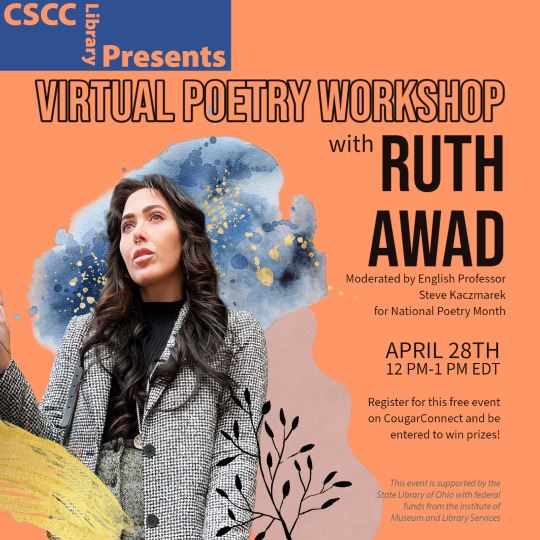
[Square graphic with orange background and blue "CSCC Library Presents" logo in upper left. Photo of poet Ruth Awad occupies the left hand side of the graphic, surrounded by abstract drawings and color splotches. Black and blue text on the top/right of the graphic: "Virtual poetry workshop with Ruth Awad / Moderated by English Professor Steve Kaczmarek for National Poetry Month / April 28th 12 PM-1 PM EDT / Register for this free event on CougarConnect and be entered to win prizes! / This event is supported by the State Library of Ohio with federal funds from the Institute of Museum and Library Services."]
Join acclaimed poet Ruth Awad and English Professor Steve Kaczmarek for an interactive poetry workshop! Ask questions and live chat with the author from your computer or mobile device.
Register on CougarConnect to be entered in a raffle to win prizes! This event is for Columbus State students, staff, and faculty only.
About the Author:
Ruth Awad is a Lebanese-American poet, a 2021 NEA Poetry fellow, and the author of Set to Music a Wildfire (Southern Indiana Review Press, 2017), winner of the 2016 Michael Waters Poetry Prize and the 2018 Ohioana Book Award for Poetry.
Her work appears in Poetry, Poem-a-Day, The Believer, The New Republic, Pleiades, The Missouri Review, The Rumpus, and elsewhere.
Learn more about Ruth at ruthawadpoetry.com.
Moderator:
Steve Kaczmarek has taught writing and literature at Columbus State for nearly 25 years and has also taught at Ohio State and Ohio Dominican universities.
His fiction appears online in such publications as Every Day Fiction, Five South Journal, and The Columbus Dispatch and is upcoming in other publications. He is also co-author of Business Communication: Building Critical Skills.
2 notes
·
View notes
Quote
Are you a husband who allows for himself what he disallows for his wife, living in abandonment with the key of her prison in his boots, gorging himself with his favorite food while she sits, by herself, before an empty dish? Or are you a companion, taking no action except hand in hand, nor doing anything unless she gives her thoughts and opinions, and sharing with her your happiness and success? If you are the first, then you are a remnant of a tribe which, still dressing in the skins of animals, vanished long before leaving the caves; and if you are the second, then you are a leader in a nation moving in the dawn toward the light of justice and wisdom.
Kahlil Gibran, The New Frontier (1925)
#kahlil gibran#poetry#words#relationships#advice#romance#the new frontier#lebanese american work#quotes#quote
4 notes
·
View notes